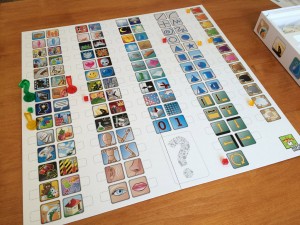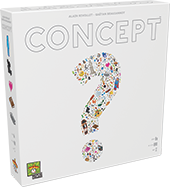Review: Concept
Posted by James (admin) on April 16th, 2014

My attempt at ‘Wheel of Fortune’ using TV show with ideas as the main concept. Then, adding a sub-concept of Title with circle, rotate & cash. Then, adding a sub-concept of Country with Red, White, Blue & Star. Anyone? Anyone? Bueller?
Concept is a party game that is a bit like charades without the acting and players use a board with icons to convey the various concepts so the other players can guess the correct answer. Each turn, the players whose turn it is draw a card and choose which word/expression they will try to convey by placing coloured markers on the different descriptive icons on the board. Player aid sheets show all the icons with 2 or 3 things that each icon could mean (although players can use them to mean anything they want). Icons show things like colours, shapes, parts of the body, etc. and some have broader potential meaning like a figure with a walking stick can mean Old/Ancient/Past.
To convey a word/phrase, the current players place various markers on these icons. There is one green question mark marker with green cubes (which is used to describe the main concept) and 4 different colour exclamation mark markers with matching coloured cubes (which can be used to describe additional sub-concepts).
For example, to convey ‘Eiffel Tower’ a player could place the green question mark on ‘Object/Thing/Package’ and a green cube on ‘Tall/Greater/High’ to try to convey the main concept is a tall object. Then, they place a red exclamation mark on ‘Location/Country/Flag’ and red cubes on ‘Red’, ‘White’, and ‘Blue’ to convey the sub-concept is a country with a red, white and blue flag. Already the description is taking shape, although players may guess it’s The Shard in London, or the World Trade Centre in New York from the same markers.
At any time, any players not doing the asking shout out what they think the answer is. Scoring is very simple – the first player to say the right answer scores 2 victory points (VPs), and each player doing the asking gets 1 VP. Light bulb counters represent the VPs which are a nice touch. The game ends when 12 questions have been guessed correctly and the player with the most VPs wins.
Concept is a fun party game especially for those who like guessing games. Using the icons and markers makes it different to other games by removing the acting or wordplay most of these games require but is still very creative and includes just as much humour and noise as players try to guess the concept. As it relies on conveying ideas through mental shorthand, it really is a test of communication requiring a mix of logical description and non-linear thinking so that you communicate in a way the other players think. The describing players can add multiple cubes to an icon to emphasise it ,and the order in which the players place the markers and cubes can also convey meaning too.
Each turn, a card is drawn and two players pick a concept on it to describe. Rather than play in set teams, a rolling pair of players asks the question. For example, if there are 4 players (A,B,C and D), then A & B would be first, then B & C, then C & D, and so on. This is a subtle but clever mechanic as it means there are no teams and the game plays with any number of players (4+). Also, it makes players ‘team-up’ with those next to them which adds a nice social element to it.

The rules say that if there is no correct guess after a time, the players can add a third player to help them describe the word. They get shown the card (so can no longer make guesses) and can help describe it and will score a VP if the word is guessed. If there’s still no correct answer, the word is revealed so no-one scores anything.
There are plenty of concepts to convey in the game with 110 cards showing 9 concepts on each card split into easy, medium and hard difficulties. Players agree if they will use easy, medium or hard words but this still gives players a choice of 3 questions on each card to pick from. The variety of the questions on the cards is extremely good too and the degrees of difficulty really are different. For example, easy questions can be ‘Monkey’, ‘Restaurant’ or ‘Policeman’; whereas, difficult questions can be ‘Cut in line’, ‘Roll up your sleeves’ or even ‘In the kingdom of the blind, the one-eyed man is king’. (Good luck with that last one but, as you have a choice of 3 answers on each card in each difficulty, you did bring it on yourself if you picked to try to convey that one.) It’s surprising how some of the easy difficulty questions can actually be more difficult to convey than they appear if players don’t pick-up on your idea.
Like many of these games, a single vocal player can by overly dominating whether drowning out quieter players when guessing or always taking over when describing a concept. This isn’t an issue with Concept’s game mechanics or its rules though, it’s something that occurs in pretty much all party games due to people’s personalities. Also, like other party games, some players will just be better at them than others because they are good at this sort of conceptual communication, or are faster at getting their thoughts out. If someone always wins in your group, maybe add a rule or two to balance it like the player with the most VPs isn’t allowed to guess words, must be silent for the first 30 seconds, or can only say 10 words during each question (which will make them more selective).
Similarly, as with other party games, players may want to be careful what they say when trying to guess as their guesses may help another player beat them to the answer.
Concept’s rules are very light and simple and, as the rules suggest, you can alter it as you wish. For example, I would like to add a time limit to each turn. Also, I don’t think the players asking the questions should be allowed to point at people or make other gestures to indicate if it’s close or not as the idea is to describe concepts using the icons. The rules say players doing the describing can only say ‘Yes’ to other players and no other direct communication but players often can’t help themselves. However, these are just my preferences.
As with other Repos Productions’ games, the physical component are great with brightly coloured pieces, excellent iconography and a custom box inner to hold all the pieces. Like most party games, Concept requires 4-12 players. I think you could make this 3 players if you only have one player describing a concept instead of two, as you always need at least 2 guessing. You can potentially play it with 2 players without the scoring and just for the fun of trying to describe things. An app or website could deliver a great solo, puzzle game too.
Overall, I think Concept is an excellent party game, especially for players that want something a bit more about ideas than acting or word play. There’s a real eagerness and excitement to try defining (or guessing) just one more concept. When an answer is revealed, you always think about how you would have described it (or you think how on earth could people have failed to guess the answer from your ‘genius’ description). I can imagine it works really well with groups of all ages including families with children too. Unfortunately, my family didn’t have a suitable Christmas gathering last year; otherwise, I would have had us playing Concept with players of ages from 12 to 80.
If you want to see what the icons are like you can see the Player Aid sheet on Repos’ web site.
James.
[Played with 6 and 8 players]

